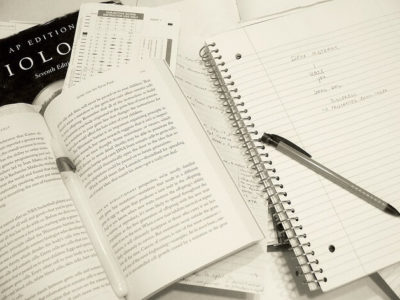Midterms are literally right around the corner, figuratively speaking. They range from the basic tests and papers to the more complicated dance performances or theater monologues. That being said, there is one common factor surrounding them all: studying. We all have to do it, whether we’d like to or not. To help you get over that final hurdle before spring break, here are a few pointers on what to remember when studying.
Flashcards
Whether it’s a class on anatomy or history, the vast majority of college courses have a lot of information to learn: important dates, vocabulary, definitions, temperatures, etc. Flashcards are the keys to studying for classes requiring you to memorize a plethora of information. They are especially good for students that have a photographic memory and are visual learners. When you physically see something over and over again, you can’t help but to hold it in your memory. This is great because once that big test comes around, your recognition of that word or important fact will trigger your memory.
Make it fun! Mix up your flashcards when you quiz yourself, or have someone else do it. Every time you get something right, reward yourself with a chip or a cookie or even a quick round of video games. If you make it fun, you won’t mind studying as much.

Put It All On Paper
You know how phrases often get lost in translation? Well, the same goes for taking notes. Writing things down helps you effectively remember all of your ideas. Typing notes up only increases the odds of you getting distracted—especially if you have Facebook or College Magazine’s Condom Balloon Contest up on the other half of the screen.
Also, in our world of technology, it’s almost second nature for us to abbreviate words on the computer rather than writing complete sentences [“I h8 dis class” vs. “I hate this class.”]. This isn’t Twitter, guys—we have more than 140 characters to write our ideas. Write it all down. It’s more efficient and academically healthier for us.
Get A Head Start
Probably one of the most difficult habits to break, procrastination is just like any other habit in that it isn’t impossible to overcome. Make an effort to get work or studying out of the way earlier so that you won’t have to cram the night before the test (or even the morning before). It is a lot less stressful. You don’t want to worry about a humongous test the night before because, believe it or not, you need your rest.
Also, don’t continue to tell yourself that you work better under pressure. Procrastination is more than just a personal choice. If you actually take the time out to try to get a head start in studying, you can eventually eliminate the word “procrastination” out of your vocabulary. Remember: procrastination is like masturbation in that, at the end of it, all you’ve done is screw yourself.
Sleep It Off
Get some rest! Resting has to be the most important part of the studying process. Sleeping helps you retain all of the information you crammed into your brain. So take a break after studying, if even just for a few hours. Take a quick nap or go to sleep for the night and start fresh when you wake up—it’ll do you a lot of good.
Studying is what you make it. It can be interesting or it can be boring. It’s completely up to you on how it turns out. Study how you feel will best help you in the long-run, but try not to make it a last minute project. That’s no good for anybody.
Happy midterms everybody! Study, study, study and let’s all get A’s!
(Notecard photo at: http://www.flickr.com/photos/heleninwales/4905108306/sizes/m/in/photostream/)



















